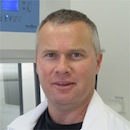Advisory Board and Editors Mycology

Theerapong Krajaejun
Professor of Clinical Pathology, Department of Pathology, Faculty of Medicine, Ramathibodi Hospital, Mahidol University, Bangkok, Thailand.

Blanca B. Landa
EDUCATION:
Ph.D. Agricultural Engineer, Institute of Sustainable Agriculture, CSIC, and University of Cordoba, Cordoba, Spain. July, 1999.
RESEARCH INTERESTS:
Population biology and biogeography of soilborne pathogens and biocontrol angents in the rhizosphere. Integrated control of plant pathogens; Rhizosphere microbial ecology; Biocontrol; Molecular diagnosis; Metagenomic analysis of microbial populations.

Erica Lumini
Dr. Erica Lumini is a Senior Researcher at the Institute for Sustainable Plant Protection, National Research Council of Italy. Her general area of research focuses on Environmental Microbiology, and more specifically:
• Interaction between soil microbes (nitrogen-fixing actinomycetes; EM ectomycorrhizal fungi; arbuscular mycorrhizal fungi, AMF) and plants of agricultural and forestry interest.
• Molecular characterization of symbiotic endobacteria and microorganisms associated with arbuscular mycorrhizal (AM) fungi.
• Molecular ecology, biodiversity and soil microbial networks (prokaryotes, eukaryotes) in natural and agroforestry ecosystems (soils subjected to land-use gradient).

Florentine Marx
Associate Professor at the Medical University of Innsbruck. We are interested in the mechanistic function and structure of antimicrobial/antifungal proteins and peptides and the identification of target molecules for the development of new antimicrobial/antifungal therapies.

Héctor Manuel Mora-Montes
In 2010, I established the Laboratory of Fungal Glycobiology at Universidad de Guanajuato, Mexico, with the main goal to understand the synthesis mechanisms of the fungal cell wall and the interaction of medically relevant fungal pathogens with the host. This laboratory is characterized by its facilities to perform chemical, immunological, genetic, molecular, and cellular analyses of human fungal pathogens. Therefore, it is among a handful of research facilities within Mexico and Latin America offering a multidisciplinary and integral approach to understand the host-fungus interaction. Our group has a solid international reputation in the molecular and immunological studies of organisms belonging to the genus Candida and Sporothrix.

Franco Nigro
Full Professor of Plant Pathology at the Department of Soil, Plant and Food Sciences of the University of Bari - Aldo Moro. He holds the courses "Biotechnology for the Health and Safety of Vegetable Production integrated with the Certification of Agri-food Production" (Master's Degree in Biotechnology for Food Quality and Safety), and the module of Phytopathological Bacteriology (Bachelor Degree in Agricultural Science and Technology). The research activity focus on some relevant diseases of olive trees (quick decline syndrome, verticillium wilt, anthracnose, cercosporiosis), citrus fruits (Phytophthora root rot, and “mal secco” diseases), stone fruit (white root rot). Recently, he also reported the occurrence of Candidatus Phytoplasma phoenicium, a quarantine pathogen of the almond tree, in Apulia.

Claudia Pogoreutz
My work broadly focuses on marine host-microbe systems, or ‘holobionts’, and the metabolic interactions that arise from and drive these complex symbiotic associations. I have always been interested in the microbial functions underlying holobiont health, resilience, and ecological adaptation, and how they shape holobiont stress responses. For this, I mainly use the cnidarian-algae symbiosis and associated bacteria as model systems, but have recently also started exploring the community structure, dynamics, and metabolic properties of fish skin microbiomes. My past and current research includes work on the contribution of nitrogen cycling pathways in cnidarian holobiont functioning and symbiotic breakdown, e.g., coral ‘bleaching’, as well as the elucidation of unknown functions of coral bacterial symbionts. For this, my approach has been to combine traditional physiological and culture-dependent techniques with high throughput-, next generation -omics applications, including whole genome and gene amplicon sequencing, transcriptomics, and proteomics. Currently, I am expanding my scope to targeted investigations of symbiotic metabolic interactions as a driver of osmoregulation in cnidarian holobionts employing nanoscale secondary ion mass spectrometry (NanoSIMS) along with isotopic profiling metabolomics.

Simon F Shamoun
Experienced Research Scientist with a demonstrated history of working with the Canadian Forest Service. Skilled in Forest Pathology, Forest Indigenous & Invasive Alien Pathogens, Sequence Analysis, Real-Time Polymerase Chain Reaction (qPCR), Epidemiology, and Molecular Ecology. Strong research professional with a M.Sc. & Doctor of Philosophy (Ph.D.) degrees focused in Forest Pathology, Biotechnology & Forest Pest Management from N.C. State University & University of Arkansas, USA, respectively.

Mark M Smits
Lector (lecturer) at HAS University of Applied Sciences in the fields of biology, soil science and data analysis. Previously worked as postdoc at Hasselt University, Lund University and University of Sheffield. PhD in soil science and geology at Wageningen University.

Peter S. Solomon
Professor, Wheat Biosecurity. Australian Research Council Future Fellow, Research School of Biology, The Australian National University. Associate Editor of Functional Plant Biology

Mark Tibbett
Professor of Soil Ecology at the University of Reading. Co-Editor-in-Chief of Soil Research.
Research interests include mycorrhiza, plant-soil interactions, terrestrial biogeochemistry and restoration ecology.

Jana M U'Ren
Assistant Professor, Department of Plant Pathology, Washington State University. PhD in Plant Pathology and Microbiology from The University of Arizona. Research focus on the ecology and evolution of fungal endophytes.

